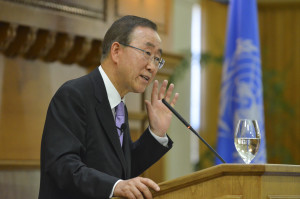On Friday, June 26, the eighth Secretary-General of the United Nations, Ban Ki-moon, spoke to the Stanford community at Encina Hall. Ban’s visit to Stanford — his second to the University in less than three years — was part of a trip to the larger Bay Area to celebrate the signing of the U.N. Charter in San Francisco 70 years ago.

On Friday, Ban Ki-moon spoke at Stanford to celebrate the signing of the U.N. Charter in San Francisco 70 years ago. (Courtesy of Rod Searcey)
Since then, the U.N. has fulfilled its charter to prevent a third world war, but Ban acknowledged room for improvement.
“I humbly accept criticism that the U.N. has not done enough,” Ban said. “But had there not been the U.N.’s continued humanitarianism, I am afraid to tell you that this world might have been poorer, more dangerous and even bloodier.”
Although the U.N. has grown to 193 member nations and works to tackle various issues from climate change and poverty to human rights and terrorism, Ban invited everyone to help build a better world.
“The U.N. cannot do it alone,” Ban said. “We need a strong solidarity among governments, business communities and civil societies, from each and every citizen. This is a critical year; 2015 is a year of global action.”
Since his appointment in 2007, Ban has continually worked to instill sustainable development, political liberation and women’s empowerment on a global scale. He also challenges the world to think of the potential the future holds.
“The 70th anniversary of the U.N. is a good moment. We should all celebrate,” Ban said. “But this celebration invites us to look beyond rather than just look back. We have to look for the future.”
Coincidentally, the U.N.’s 70th anniversary also fell on a day of celebration in America that came in response to the U.S. Supreme Court ruling that legalized same-sex marriages nationwide.
Ban, who has long advocated for equality, drew a round of applause when he saluted the court ruling as “a great step forward for human rights.”
Ban also praised Stanford for its efforts and impact on the world.
“Stanford is the grace of household names,” Ban said. “The name itself carries far and wide around the world. Therefore, you all should be very proud. I am thankful for your contributions to the world.”
Ban explained that the Bay Area has a special place in his heart, as it was the first place he had visited outside Korea. Coming from a war-torn Korea, he described coming to America as “going from hell to heaven.”
“[America is] the place where I was lit by what I saw,” Ban said. “I decided I should think beyond just what Korea could do. America shaped my vision as a global citizen.”
Ban cited his meeting with John F. Kennedy as the first time he truly understood what it meant to be a global citizen and invited everyone to join.
“[Mr. Kennedy said] there are no national boundaries,” Ban said. “There is only a question of whether we can extend a helping hand.”
Ban closed his speech with an invitation for youth to better the world as well.
“We often say the the younger generation is the future of tomorrow, but many young people have taken their leadership role today,” Ban said. “I sincerely believe that I will pass my torch to a brighter future.”
This article first appeared in the Stanford Daily by Jocelyn Woods and Nayanika Kapoor. Contact Jocelyn Woods and Nayanika Kapoor at jocelynwoods16 ‘at’ mittymonarch.com and 16nkapoor ‘at’ castilleja.org.
